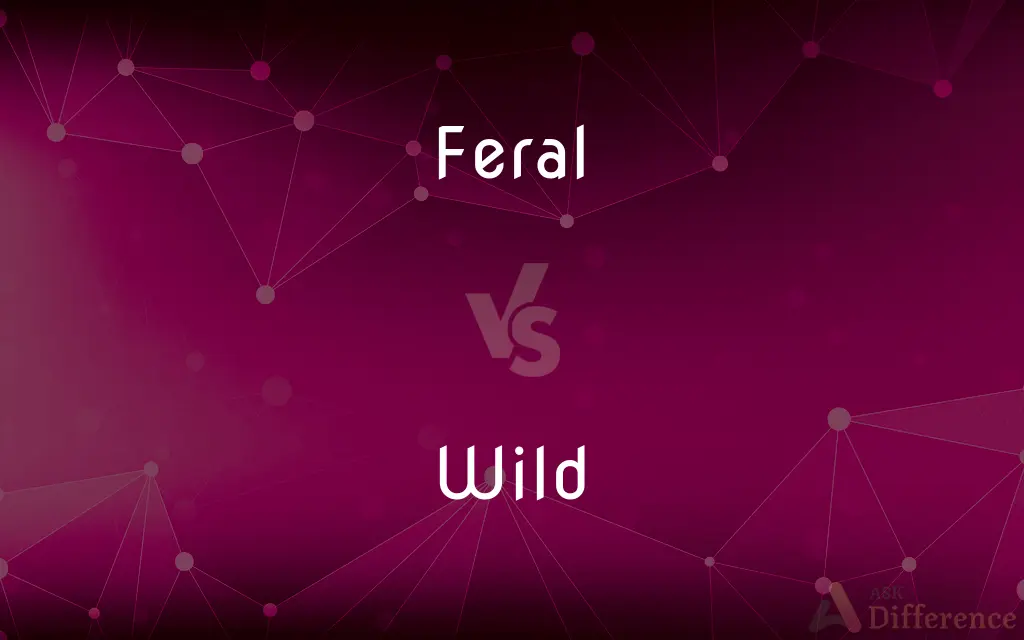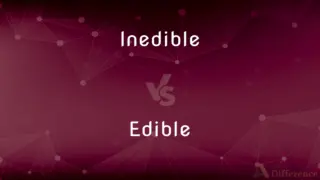Feral vs. Wild — What's the Difference?
Edited by Tayyaba Rehman — By Urooj Arif — Updated on March 19, 2024
Feral refers to domestic animals that have returned to the wild, while wild animals have never been domesticated.

Difference Between Feral and Wild
Table of Contents
ADVERTISEMENT
Key Differences
Feral animals originate from domesticated species that have returned to a wild state, often due to abandonment, escape, or release into the wild. These animals can survive and reproduce without human intervention, but they still carry genetic traits of their domestic lineage. Wild animals, on the other hand, have never undergone the process of domestication and have lived in natural environments for countless generations, adapting to their surroundings without direct human influence.
The behavior of feral animals can be markedly different from their domestic counterparts due to the necessity of adapting to life in the wild. This includes changes in diet, social structures, and survival strategies. In contrast, wild animals' behaviors are the result of natural evolutionary processes, optimized for survival and reproduction in their specific habitats without any human-induced alterations.
Feral populations can sometimes pose ecological problems, as they might not fit seamlessly into local ecosystems and can compete with native species for resources, spread diseases, or disrupt habitats. Wild species, however, are integral parts of their ecosystems, evolved to maintain the balance of their natural environments.
The process of a domestic animal becoming feral is called feralization, which can happen over several generations, with the animals becoming more adapted to wild life. There is no such process for wild animals, as they are already suited to their environment from birth, with their behaviors and physical traits honed by natural selection.
Management and conservation strategies differ significantly for feral and wild animals. Feral animals may be subject to control or eradication programs to protect native ecosystems, while conservation efforts for wild animals focus on preserving natural habitats and maintaining biodiversity.
ADVERTISEMENT
Comparison Chart
Origin
Domesticated animals that have reverted to the wild
Animals that have never been domesticated
Behavior
Adapts from domesticated behaviors to survive in the wild
Behaviors optimized through natural selection for survival in specific habitats
Ecological Impact
Can disrupt local ecosystems and compete with native species
Integral to their ecosystems, maintaining ecological balance
Process
Feralization: The transition from domesticated to wild state
N/A - wild animals are naturally adapted to their environment
Management
May involve control or eradication to protect native species
Focuses on habitat preservation and maintaining biodiversity
Compare with Definitions
Feral
Domestic animals that have returned to the wild and are self-sustaining.
Feral cats often form colonies and hunt to survive.
Wild
Animals that live in natural environments without human domestication.
Lions in the African savanna are iconic wild animals.
Feral
Not fully adapted to wild life but can survive without human care.
Feral pigs can cause significant ecological damage due to their domestic origins.
Wild
Behaviors and physical traits are the result of natural selection.
The camouflage of wild leopards allows them to be effective predators.
Feral
Subject to management practices to protect native species.
Efforts to control feral goat populations help preserve natural vegetation.
Wild
Integral to the balance of their ecosystems.
Wild bees play a crucial role in pollination and biodiversity.
Feral
May retain some traits of domestication.
Feral horses, despite living in the wild, can sometimes be approached more easily than truly wild horses.
Wild
Not influenced by direct human intervention in their development.
Wild salmon migrate and breed according to natural cycles.
Feral
Can impact native wildlife and ecosystems.
Feral rabbits in Australia compete with native species for resources.
Wild
Conservation focuses on habitat preservation.
Protecting rainforests helps conserve the myriad of wild species that inhabit them.
Feral
A feral animal or plant (from Latin: fera, 'a wild beast') is one that lives in the wild but is descended from domesticated specimens. As with an introduced species, the introduction of feral animals or plants to non-native regions may disrupt ecosystems and has, in some cases, contributed to extinction of indigenous species.
Wild
(of an animal or plant) living or growing in the natural environment; not domesticated or cultivated
Wild strawberries
A herd of wild goats
Feral
Having returned to an untamed state from domestication
A pack of feral dogs.
Wild
(of a place or region) uninhabited, uncultivated, or inhospitable
The wild coastline of Cape Wrath
An expanse of wild moorland
Feral
Existing in a wild or untamed state.
Wild
Lacking discipline or restraint
Wild parties were never her scene
Feral
Of or suggestive of a wild animal; savage
A feral grin.
Wild
Not based on sound reasoning or probability
A wild guess
Wild rumours were circulating
Performing in Hollywood was beyond my wildest dreams
Who, even in their wildest dreams, could have anticipated such a victory?
Feral
Wild, untamed.
Wild
(of a playing card) deemed to have any value, suit, colour, or other property in a game at the discretion of the player holding it.
Feral
Of an animal, being wild but descended from domestic or captive animals.
Wild
A natural state or uncultivated or uninhabited region
Kiwis are virtually extinct in the wild
Feral
(of a person) Contemptible, unruly, misbehaved.
Wild
Treat (a person or animal) harshly, so that they become untrusting or nervous
Let your pigeon fly for a while: we don't want to wild him
Feral
Deadly, fatal.
Wild
Occurring, growing, or living in a natural state; not domesticated, cultivated, or tamed
Wild geese.
Edible wild plants.
Feral
Of or pertaining to the dead, funereal.
Wild
Not inhabited or farmed
Remote, wild country.
Feral
A domesticated animal that has returned to the wild; an animal, particularly a domesticated animal, living independently of humans.
Wild
Uncivilized or barbarous.
Feral
A contemptible young person, a lout, a person who behaves wildly.
Wild
Lacking supervision or restraint
Wild children living in the street.
Feral
A person who has isolated themselves from the outside world; one living an alternative lifestyle.
Wild
Disorderly; unruly
A wild scene in the school cafeteria.
Feral
A character in furry art or literature which has the physical characteristics (body) of a regular animal (typically quadripedal), that may or may not be able to communicate with humans or anthros (contrasts anthro)
The story is about a group of ferals which have to explore the ruins of society after the humans die out.
Wild
Characterized by a lack of moral restraint; dissolute or licentious
Recalled his wild youth with remorse.
Feral
Wild; untamed; ferine; not domesticated; - said of beasts, birds, and plants.
Wild
Lacking regular order or arrangement; disarranged
Wild locks of long hair.
Feral
Funereal; deadly; fatal; dangerous.
Wild
Full of, marked by, or suggestive of strong, uncontrolled emotion
Wild with jealousy.
A wild look in his eye.
A wild rage.
Feral
Wild and menacing;
A ferocious dog
Wild
Extravagant; fantastic
A wild idea.
Wild
Furiously disturbed or turbulent; stormy
Wild weather.
Wild
Risky; imprudent
Wild financial schemes.
Wild
Impatiently eager
Wild to get away for the weekend.
Wild
(Informal) Highly enthusiastic
Just wild about the new music.
Wild
Based on little or no evidence or probability; unfounded
Wild accusations.
A wild guess.
Wild
Deviating greatly from an intended course; erratic
A wild bullet.
Wild
(Games) Having an equivalence or value determined by the cardholder's choice
Playing poker with deuces wild.
Wild
In a wild manner
Growing wild.
Roaming wild.
Wild
A natural or undomesticated state
Returned the zoo animals to the wild.
Plants that grow abundantly in the wild.
Wild
Often wilds A region that is mostly uninhabited or uncultivated
The wilds of the northern steppes.
Wild
To go about in a group threatening, robbing, or attacking others.
Wild
; not domesticated; specifically, in an unbroken line of undomesticated animals (as opposed to feral, referring to undomesticated animals whose ancestors were domesticated).
Przewalski's horses are the only remaining wild horses.
Wild
From or relating to wild creatures.
Wild honey
Wild
Unrestrained or uninhibited.
I was filled with wild rage when I discovered the infidelity, and punched a hole in the wall.
Wild
, unruly, or licentious.
The fraternity was infamous for its wild parties, which frequently resulted in police involvement.
Wild
(electrical engineering) Of unregulated and varying frequency.
The aircraft's navigational equipment should not be powered from the wild AC bus except in an emergency, as its computers can be damaged by variations in electrical frequency.
Wild
Visibly and overtly anxious; frantic.
Her mother was wild with fear when she didn't return home after the party.
Wild
; very angry.
Wild
, tangled, or untidy.
After a week on the trail without a mirror, my hair was wild and dirty.
Wild
Very inaccurate; far off the mark.
The novice archer fired a wild shot and hit her opponent's target.
Wild
To the wind and sea; unsheltered.
A wild roadstead
Wild
To steer.
Wild
Not capable of being represented as a finite closed polygonal chain.
Wild
(slang) Amazing, awesome, unbelievable.
Did you hear? Pat won the lottery! — Wow, that's wild!
Wild
Able to stand in for others, e.g. a card in games, or a text character in computer pattern matching.
In this card game, aces are wild: they can take the place of any other card.
Wild
Of an audio recording: intended to be synchronized with film or video but recorded separately.
A wild track; wild sound
Wild
Inaccurately; not on target.
The javelin flew wild and struck a spectator, to the horror of all observing.
Wild
(of an audio recording) Intended to be synchronized with film or video but recorded separately.
Let's record it wild.
Wild
The undomesticated state of a wild animal.
After mending the lion's leg, we returned him to the wild.
Wild
A wilderness.
Wild
To commit random acts of assault, robbery, and rape in an urban setting, especially as a gang.
Wild
(In the form wilding or wildin') To act in a strange or unexpected way.
Wild
Living in a state of nature; inhabiting natural haunts, as the forest or open field; not familiar with, or not easily approached by, man; not tamed or domesticated; as, a wild boar; a wild ox; a wild cat.
Winter's not gone yet, if the wild geese fly that way.
Wild
Growing or produced without culture; growing or prepared without the aid and care of man; native; not cultivated; brought forth by unassisted nature or by animals not domesticated; as, wild parsnip, wild camomile, wild strawberry, wild honey.
The woods and desert caves,With wild thyme and gadding vine o'ergrown.
Wild
Desert; not inhabited or cultivated; as, wild land.
Wild
Savage; uncivilized; not refined by culture; ferocious; rude; as, wild natives of Africa or America.
Wild
Not submitted to restraint, training, or regulation; turbulent; tempestuous; violent; ungoverned; licentious; inordinate; disorderly; irregular; fanciful; imaginary; visionary; crazy.
What are theseSo withered and so wild in their attire ?
With mountains, as with weapons, armed; which makesWild work in heaven.
The wild winds howl.
Search then the ruling passion, there, aloneThe wild are constant, and the cunning known.
Wild
Exposed to the wind and sea; unsheltered; as, a wild roadstead.
Wild
Indicating strong emotion, intense excitement, or ewilderment; as, a wild look.
Wild
Hard to steer; - said of a vessel.
Wild
An uninhabited and uncultivated tract or region; a forest or desert; a wilderness; a waste; as, the wilds of America; the wilds of Africa.
Then Libya first, of all her moisture drained,Became a barren waste, a wild of sand.
Wild
Wildly; as, to talk wild.
Wild
A wild primitive state untouched by civilization;
He lived in the wild
Wild
A wild and uninhabited area
Wild
Marked by extreme lack of restraint or control;
Wild ideas
Wild talk
Wild originality
Wild parties
Wild
In a natural state; not tamed or domesticated or cultivated;
Wild geese
Edible wild plants
Wild
In a state of extreme emotion;
Wild with anger
Wild with grief
Wild
Deviating widely from an intended course;
A wild bullet
A wild pitch
Wild
(of colors or sounds) intensely vivid or loud;
A violent clash of colors
Her dress was a violent red
A violent noise
Wild colors
Wild shouts
Wild
Not subjected to control or restraint;
A piano played with a wild exuberance
Wild
Talking or behaving irrationally;
A raving lunatic
Wild
Produced without being planted or without human labor;
Wild strawberries
Wild
Located in a dismal or remote area; desolate;
A desert island
A godforsaken wilderness crossroads
A wild stretch of land
Waste places
Wild
Without civilizing influences;
Barbarian invaders
Barbaric practices
A savage people
Fighting is crude and uncivilized especially if the weapons are efficient
Wild tribes
Wild
(of the elements) as if showing violent anger;
Angry clouds on the horizon
Furious winds
The raging sea
Wild
In an uncontrolled and rampant manner;
Weeds grew rampantly around here
Wild
In a wild or undomesticated manner;
Growing wild
Roaming wild
Common Curiosities
How do wild animals differ from feral animals in behavior?
Wild animals' behaviors are finely tuned by natural selection for survival in their specific environments, unlike feral animals, which must adapt from domesticated behaviors.
How do humans manage feral populations?
Management can include sterilization programs, culling, or rehoming, depending on the species and context.
Why are feral animals considered a problem?
Feral animals can disrupt local ecosystems, outcompete native species, spread diseases, and damage habitats.
Why is habitat preservation important for wild animals?
Habitat preservation ensures that wild animals have the resources and space they need to survive and reproduce, maintaining natural processes and biodiversity.
Can feral animals become truly wild?
Over many generations, feral animals may become more adapted to the wild, but they may still retain genetic traces of their domesticated ancestors.
What makes an animal feral?
An animal becomes feral when it descends from domesticated individuals but lives and reproduces in the wild without human care.
What is the main concern with conserving wild animals?
The main concern is preserving their natural habitats and maintaining the ecological balance, which supports biodiversity.
How can the spread of feral animals be prevented?
Responsible pet ownership, including neutering and not releasing unwanted pets into the wild, can prevent the establishment of new feral populations.
Can feral animals ever be beneficial to ecosystems?
While typically viewed as disruptive, in some rare cases, feral animals may fill niches left by extinct native species, though this is not common.
What is the difference between a stray and a feral animal?
A stray is an individual domestic animal that has lost its home, while a feral animal is part of a self-sustaining population that lives without direct human support.
Share Your Discovery

Previous Comparison
Inedible vs. Edible
Next Comparison
Unannealed vs. AnnealAuthor Spotlight
Written by
Urooj ArifUrooj is a skilled content writer at Ask Difference, known for her exceptional ability to simplify complex topics into engaging and informative content. With a passion for research and a flair for clear, concise writing, she consistently delivers articles that resonate with our diverse audience.
Edited by
Tayyaba RehmanTayyaba Rehman is a distinguished writer, currently serving as a primary contributor to askdifference.com. As a researcher in semantics and etymology, Tayyaba's passion for the complexity of languages and their distinctions has found a perfect home on the platform. Tayyaba delves into the intricacies of language, distinguishing between commonly confused words and phrases, thereby providing clarity for readers worldwide.













































